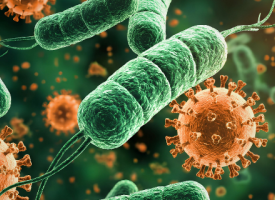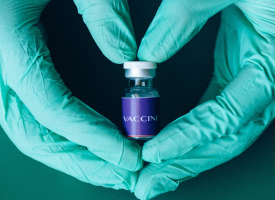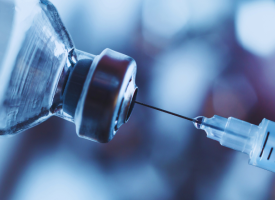Transcript - AMA President Dr Omar Khorshid on Omicron and need for NSW to reintroduce restrictions on ABC News
Transcript: AMA President, Dr Omar Khorshid, Outlet: ABC News, Saturday 18 December 2021
Subject: Omicron and need to reintroduce restrictions in NSW
HOST: Miriam Corowa
MIRIAM COROWA: The Australian Medical Association has called on the New South Wales Government to reimpose restrictions across the state, after a steep rise in coronavirus infections. There were almost 2500 cases reported today, a new national record, and there is concern the state's healthcare system will be unable to keep up. AMA President Dr Omar Khorshid joins us now from Perth. Dr Khorshid, New South Wales, they continue to break their daily infection records and also for Australia, Victoria remains at around 1,500 cases a day. We are being told, though, that tighter restrictions won't be needed if hospitals aren't seeing significant increases in patient numbers. So, have we struck, now, an appropriate balance in living with COVID?
OMAR KHORSHID: No, Miriam, unfortunately we haven't, and the explanation for that really is Omicron. If you look at what's happening in Europe as we have just seen, and indeed what is happening right now in New South Wales, where instead of flattening the curve, we've got a curve that's actually almost vertical. Now, remembering that hospitalisations lag behind infections quite significantly by a week or even two weeks, it's too late once we actually see a sharp rise in hospitalisations. And the right thing to do right now is try and flatten that curve a little bit, because we don't know what proportion of people who get Omicron a going to end up in hospital. We simply don't have that information as yet. It seems more mild, but if you end up with tens of thousands of people every day getting infected, which is quite a realistic prospect for New South Wales, then even if a small proportion end up in hospital, that could still overwhelm the system. And of course, you've also got to take into account all those people who are exposed to Omicron, who therefore have to be kept away from their work. If their children catch it, they're going to be kept away from their work. Now that's right across the economy, but of course the impact in healthcare is devastating.
MIRIAM COROWA: And are we seeing as well, with this new approach around how we live with COVID and reducing restrictions, does that place the onus on individuals and also general health practitioners to then step up their efforts in this new phase?
OMAR KHORSHID: Well, I think health practitioners have been stepping up for an awfully long time now, and they were looking forward to a bit of a break over Christmas. Instead we've got government, the New South Wales Government saying to them, especially GPs, well, you're going to be looking after these thousands and thousands of new COVID cases every day, because they don't need hospital. And in fact, while you are there, we also need you to be really pulling out all stops to get the booster doses into arms. So it's actually a very, very tough time for GPs in particular. And those who are working in hospitals are just worried. They're worried that these sharp rises in cases will eventually lead to huge pressure on the hospital system. Now, it is preventable, not totally preventable, but certainly we can reduce the impact by simple measures. Masks are not a huge impact on individual freedoms, we've been living with them for such a long time now, and it's very bizarre timing from the New South Wales Government to pull out a mask mandate just when you are seeing an incredible spike in cases that matches what's happening around the world.
MIRIAM COROWA: And as you mentioned there, we are still waiting to find out just how Omicron will be impacting communities. Some initial research just out says that it could be more than five times more infectious than the Delta variant. How concerned are you about the possible effects of Omicron?
OMAR KHORSHID: We are very concerned about the number of Australians who are going to contract Omicron. It's likely to be a very, very large number. And even if the severity is less, there is still a potential of long COVID, and of course there's the potential that the vulnerable people will bear the brunt of the illness, as has been the case throughout the pandemic. There's a lot still to be learned about Omicron, and we are urging a cautious approach to follow the lessons that we have learnt. We've learnt some of these lessons around the world the hard way throughout the pandemic. Let's not forget them, just at the time when we need them most.
MIRIAM COROWA: Now, when you talk about looking around the world, we can look particularly, I suppose, to the United Kingdom. What do you think might now happen here in Australia in the weeks ahead?
OMAR KHORSHID: What we're going to see in New South Wales, where Omicron has taken hold, is a very rapid increase in cases. We will see the population gradually getting their booster doses, but not at anywhere near the rate to actually slow down this Omicron wave that's likely to wash through. Now, our hope is that because it's coming on so fast, that it'll actually come off fairly fast as well. But that all, of course, remain to be seen. And the pressure on the rest of the system is still at this stage, unfortunately, an unknown. So, it does come down, whilst governments aren't acting, to individuals, to make sure that every time that you are out of the house you've got your mask on. That you avoid mass gatherings as we come through the rest of the Christmas period, so that you are not having to isolate when it comes to Christmas Day. And of course, as soon as you are eligible for a booster, go and get one, because we're seeing great data that, in fact, boosters are able to stop you getting very sick from Omicron.
MIRIAM COROWA: Dr Omar Khorshid, the President of the Australian Medical Association, thank you so much for speaking with us on ABC News.
OMAR KHORSHID: Thanks Miriam.



